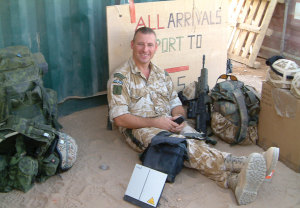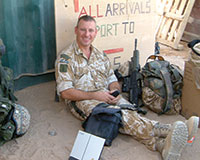One of the keys to the success of the Army Reserve is having supportive and encouraging employers. As part of its Diversity Week activities, CBRE hosted a talk about how it is doing its bit and why members of the armed forces are an asset to any company. Rebecca Kent went along to find out more
A picture of Cliff Dare, CBRE’s head of capital projects, shows him in combat gear, sat on dry sand surrounded by military rucksacks, helmets and combative equipment.

He wears a wide smile.
“That was me negotiating a planning consent on a satellite phone while I was mobilised in Sangin in Afghanistan. That’s the truth. And we got the planning consent, too, which was nice.”
This is a story he tells proudly, and it captures perfectly that it is possible to juggle the commitments of being a military reservist with the demands of a job in property.
In 2012, the Ministry of Defence made a £1.8bn pledge to expand the voluntary Army Reserve to 30,000 by 2020, and make it more integrated with regular forces in the interests of national security.
With an ambition like this, it is inevitable that an increasing number of people will be juggling not just their personal and professional lives, but a military life as well. And, to transition between the three successfully, they will need employers that understand the commitment required.
Dare, who has been a reservist for 20 years, after serving as a regular Royal Marine, set up the Armed Forces Network at CBRE in 2014 to champion this part of its workforce.
“The reservists and veteran community are a central cohort of the UK as a whole, and so to stimulate a more broad and diverse employee population in CBRE, establishing the network was the right thing to do,” he said.
So what does it take to be a reservist?
 You can pursue a career in the Army Reserve as long as you are between 18 and 50 years old. Training requires a basic commitment of 27 days a year, including weekends, evenings and a two-week annual camp, though that commitment varies depending on whether you pursue a route into the air force, navy or marines. Advance notice of dates is given so there is ample time to organise your diary.
You can pursue a career in the Army Reserve as long as you are between 18 and 50 years old. Training requires a basic commitment of 27 days a year, including weekends, evenings and a two-week annual camp, though that commitment varies depending on whether you pursue a route into the air force, navy or marines. Advance notice of dates is given so there is ample time to organise your diary.
Most employers grant additional paid leave for training. In the case of CBRE, it is 10 days. And in those days spent training, you can be doing anything from learning a language to sailing to running through muddy fields or jumping out of a plane.
Adventures aside, there are financial incentives. Reservists are paid an annual training bounty of up to £395 in the first year, which increases to £1,556 after five years. Travel expenses and courses are covered, and there are wide-ranging discounts afforded to members, too. If you are mobilised – in the current political context, you could find yourself helping with the migrant crisis – you will be compensated. And there is no need for concern about the security of your job because while you are away, your employer must keep your job open for you by law.
There is something in it for bosses, too. Veterans and reservists come with the inherent qualities of loyalty, punctuality, motivation and the ability to remain calm under fire, which is useful in the cut and thrust world of property.
But anyone who is thinking of joining the reserve should know – as should employers – that a commitment comes with challenges, and Dare is careful not to underplay the toll it can take on one’s mental health and personal relationships.
“I was one of the first troops in Iraq in 2003 and though the experience is almost impossible to portray, it was a fantastic time for me. But the experience of coming back wasn’t. Frankly, I didn’t want to. Having been in Iraq in war, the last thing
I wanted to hear was people complaining about their issues in the office,” he said.
It is further evidence if needed that supportive businesses are key.
And, more pertinently, for an industry working hard to increase its diversity record, it could do worse than champion men and women of the reserve.
Use the force
The Forces in Real Estate, or FiRE, is an informal networking group for veterans and reservists who work in the industry.
They meet for breakfasts quarterly, allowing like-minded folk to exchange experiences and business.
To find out more, contact Chris Hartley at chris@thegoodrubbishcompany.co.uk
To join the Army Reserve visit www.army.mod.uk/reservist
The Defence Relationship Management supports businesses in employing members of the armed forces. See more at www.gov.uk/government/groups/defence-relationship-management
• To send feedback, e-mail Rebecca.Kent@estatesgazette.com or tweet @Writer_RKent or @estatesgazette











